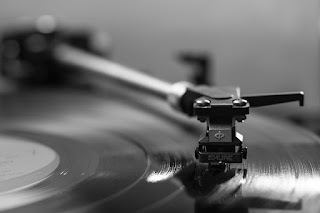 Kim BellardLiving in the 21st century is cool, right? We've got smartphones, ultra-thin tablets, the Internet, wearables, Uber, self-driving cars, virtual/augmented reality (VR/AR), drones, digital currency, and all the TV/movies/music you could want available for streaming anytime, anywhere. It makes Back to the Future II's 2015 look drab by comparison (except maybe for the hoverboards!).
Kim BellardLiving in the 21st century is cool, right? We've got smartphones, ultra-thin tablets, the Internet, wearables, Uber, self-driving cars, virtual/augmented reality (VR/AR), drones, digital currency, and all the TV/movies/music you could want available for streaming anytime, anywhere. It makes Back to the Future II's 2015 look drab by comparison (except maybe for the hoverboards!).
So why does it seem like so many people are entranced with the 1980's?
Take, for example, the resurgence of vinyl. Vinyl was replaced by cassettes in the 1980's, which were superseded by CDs in the 1990's, which fell to digital music in the 2000's. But not so fast. Vinyl is back, set to become a billion dollar industry (again).
Sales of vinyl in the U.S. rose some 26% in 2016, and brought in more revenue than YouTube Musc, VEVO, SoundCloud, and Free Spotify combined. It actually outsold digital music in the UK.
There's even an annual Record Store Day to help celebrate vinyl's resurgence...
It's not just vinyl. People are falling in love with cassette tapes again. Their sales rose 74% in 2016. although the number of units was still well short of vinyl or CDs. Indie bands like them, as a cheap means of exposure, although major labels are exploiting them too, such as the release of the Guardians of the Glaxcy soundtrack cassette (the movie featured a main character toting around a beloved mix tape on his Walkman -- I kid you not -- as he battles evildoers throughout the universe).
There's a Cassette Store Day too.
People are even inventing new ways to listen to old formats.
The Verge reports on
Love, "the first intelligent turntable," which is supposed to bridge old-tech with new tech, as well as
Rokblok.
Retro isn't confined to music. One of the hottest Christmas presents was the
Nintendo NES Classic, a modern, hand-held update of the original console, complete with 30 (mostly) vintage games. Released in November 2016, it sold out
almost immediately, and continues to have
supply issues. The president of Nintendo of America
told Wired that they had assumed it would appeal to 30 to 40 year-olds who had played it as children, but its appeal proved much broader (
some see intentional reasons behind the scarcity, but that's another story).
If any industry would keep its eye relentlessly on the future, you might expect it would be health care. Better understanding of causes of diseases and underlying risk factors, more and better treatment options, slick new technology like wearables and nanotechnology. Few of us would want to go back to what health care was like in the 1980's, and none of us would accept the health care of the 1950's (except maybe those house calls).
No, in health care we expect the kind of futuristic -- or, at least, modern -- experience that tech-based start-ups like
Oscar Health,
Zoom Health, and the newest of all,
Forward are promising. They all want to offer "Apple Store" experience for health care (although, I don't know about you, but I usually end up waiting a lot in Apple Stores).
Oh, wait -- that is our health care system, for the most part. It hasn't gone retro because we haven't yet moved past retro.
Get this: fax machines
remain the predominant form of communication in health care, with fax volume
hitting new records. That's not retro, that is insanity.
I get retro. I'm a Baby Boomer, after all, and very partial to the music, movies, television shows, cars, and other cultural aspects of the era in which I grew up. We all are nostalgic about things from our formative years.
But I do not want to get care in a retro health care system.
EHRs are a perfect example of how we took something that should revolutionize health care, and turned it into something that not only no one is happy with but that many feel often impedes care, to the point some want to go back to paper records. That's not retro, that's just stupid. We didn't do the wrong thing with EHRs, we just are doing it wrong.
As I've written before, we should be thinking
big and bold about how we want our health care system to work in the 21st century. We should be
setting tough goals for how effectively it works for us -- and expecting to achieve them. We should be looking forward, not backward.
We have all the technology we need to make our health care experience, well, if not
like magic, then certainly more like a 21st century health care should seem. Let's get there first -- then maybe we can think about how we can do some cute retro to it.
 Kim BellardLiving in the 21st century is cool, right? We've got smartphones, ultra-thin tablets, the Internet, wearables, Uber, self-driving cars, virtual/augmented reality (VR/AR), drones, digital currency, and all the TV/movies/music you could want available for streaming anytime, anywhere. It makes Back to the Future II's 2015 look drab by comparison (except maybe for the hoverboards!).
Kim BellardLiving in the 21st century is cool, right? We've got smartphones, ultra-thin tablets, the Internet, wearables, Uber, self-driving cars, virtual/augmented reality (VR/AR), drones, digital currency, and all the TV/movies/music you could want available for streaming anytime, anywhere. It makes Back to the Future II's 2015 look drab by comparison (except maybe for the hoverboards!). 